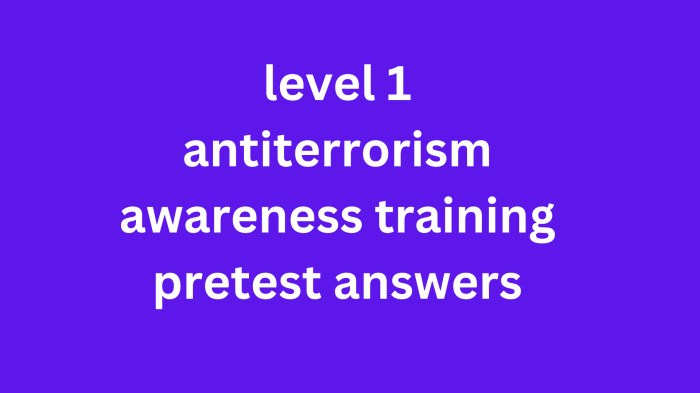The Level 1 Antiterrorism Awareness Training Pretest serves as a comprehensive evaluation tool designed to assess an individual’s knowledge and understanding of fundamental antiterrorism principles. This pretest plays a crucial role in identifying areas for improvement and ensuring that participants possess the necessary awareness and skills to mitigate potential threats.
Through a series of carefully crafted questions, the pretest covers a wide range of topics, including the definition and forms of terrorism, motivations and ideologies behind terrorist activities, protective measures against attacks, proper reporting channels, and the role of organizational preparedness.
By completing this pretest, individuals can gain valuable insights into the complexities of terrorism and enhance their ability to contribute to effective counterterrorism efforts.
Introduction to Level 1 Antiterrorism Awareness Training Pretest

The Level 1 Antiterrorism Awareness Training Pretest is designed to assess an individual’s knowledge and understanding of antiterrorism measures and best practices. It provides a foundation for further training and enhances an individual’s ability to recognize, report, and respond to potential terrorist threats.
Antiterrorism awareness training is crucial in today’s global security landscape. Terrorism remains a persistent threat, and individuals play a vital role in preventing and mitigating its impact. This pretest will cover key topics essential for developing a heightened awareness of terrorism and the necessary protective measures.
Terrorism Awareness
Definition and Forms of Terrorism
Terrorism is defined as the unlawful use of violence or the threat of violence to intimidate or coerce a government, organization, or civilian population to achieve political, religious, or ideological goals. Terrorism can manifest in various forms, including bombings, shootings, kidnappings, and cyberattacks.
Motivations and Ideologies
Terrorist activities are driven by diverse motivations and ideologies. These may include religious extremism, political grievances, separatist aspirations, or a desire to create chaos and disruption. Understanding the underlying ideologies and motivations can help identify potential threats and develop effective counterterrorism strategies.
Key Indicators and Warning Signs
Recognizing potential terrorist threats requires awareness of key indicators and warning signs. These may include suspicious behavior, unusual purchases or activities, extremist rhetoric, or communication with known terrorist organizations. Reporting these indicators to authorities is essential for early detection and prevention.
Protective Measures: Level 1 Antiterrorism Awareness Training Pretest

Personal Protective Measures
Individuals can take personal protective measures to reduce their vulnerability to terrorist attacks. These include maintaining situational awareness, avoiding suspicious locations, reporting suspicious activities, and having an emergency plan in place.
Situational Awareness
Situational awareness involves paying attention to one’s surroundings and being alert to potential threats. It includes observing people, vehicles, and activities that appear out of place or unusual.
Reporting Suspicious Activities, Level 1 antiterrorism awareness training pretest
Reporting suspicious activities to law enforcement is crucial for preventing terrorism. If an individual observes something suspicious, they should immediately contact the appropriate authorities.
Role of Law Enforcement and Security Personnel
Law enforcement and security personnel play a vital role in preventing terrorism. They monitor potential threats, investigate suspicious activities, and respond to terrorist incidents. Cooperation between individuals and law enforcement is essential for effective counterterrorism efforts.
Communication and Reporting
Proper Reporting Channels
Individuals should be aware of the proper channels for reporting suspicious activities or potential threats. This may include local law enforcement agencies, national security hotlines, or online reporting platforms.
Clear and Timely Communication
During an emergency, clear and timely communication is essential. Individuals should follow instructions from authorities and provide accurate information to facilitate an effective response.
Technology and Social Media
Technology and social media can play a role in information sharing and response coordination. However, it is important to use these platforms responsibly and avoid spreading misinformation or panic.
Organizational Preparedness

Effective Antiterrorism Plan
Organizations should develop and implement an effective antiterrorism plan that Artikels security measures, emergency procedures, and response protocols. This plan should be regularly reviewed and updated to ensure its effectiveness.
Training and Drills
Regular training and drills are essential for organizational preparedness. They enhance employee awareness, practice response procedures, and improve overall preparedness in the event of a terrorist incident.
Leadership and Coordination
Leadership plays a crucial role in coordinating and managing response efforts. Designated leaders should be responsible for implementing the antiterrorism plan, communicating with authorities, and ensuring the safety of employees.
Questions Often Asked
What is the purpose of the Level 1 Antiterrorism Awareness Training Pretest?
The pretest is designed to assess an individual’s baseline knowledge of antiterrorism principles, identify areas for improvement, and ensure preparedness in mitigating potential threats.
What topics are covered in the pretest?
The pretest covers a comprehensive range of topics, including the definition and forms of terrorism, motivations and ideologies behind terrorist activities, protective measures against attacks, proper reporting channels, and the role of organizational preparedness.
Who should take the Level 1 Antiterrorism Awareness Training Pretest?
This pretest is recommended for individuals who seek to enhance their understanding of antiterrorism measures, including security personnel, law enforcement officers, emergency responders, and members of the general public.